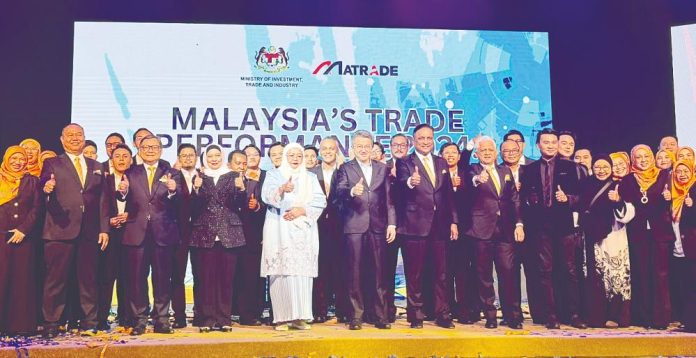KUALA LUMPUR: Malaysia will boost its exports this year by emphasising strategic cooperation with free trade agreement (FTA) partners and new emerging markets.
Investment, Trade and Industry Minister Tengku Datuk Seri Utama Zafrul Tengku Abdul Aziz highlighted that emerging markets remain a key focus for Malaysia, with trade expansion efforts targeting Africa, the Middle East and Latin America.
“This is reflected by notable growth recorded in 2024 in trade with African nations, such as Angola (59.3%), Ethiopia (56.4%), Egypt (53.6%), Algeria (27.9%) and Libya (19.7%),” he said at Malaysia’s Trade Performance 2024 Event today.
Tengku Zafrul said Malaysia is also diversifying within Asean, targeting rapidly urbanising cities such as Medan (northern Sumatra, Indonesia), Surabaya (eastern Java, Indonesia), Da Nang (central Vietnam), Hai Phong (northern Vietnam) and Can Tho (southern Vietnam).
“This diversification strategy will be key for Malaysia to sustain its strong trade performance in the coming years,” he said.
In 2024, Malaysia’s trade reached a historic milestone, rebounding 9.2% year-on-year to a record RM2.88 trillion.
Exports grew by 5.7% to RM1.508 trillion, marking the second consecutive year exports surpassed RM1.5 trillion, following RM1.55 trillion in 2022. Imports increased by 13.2% to RM1.371 trillion, contributing to a trade surplus of RM136.88 billion – the highest trade value ever recorded in the country’s history.
Matrade chairman Datuk Seri Reezal Merican Naina Merican attributed the strong trade performance to the unwavering support of national leadership and collaborative efforts. “This unprecedented accomplishment would not have been possible without the strong support and commitment of our Prime Minister, Deputy Prime Ministers, and our Minister of Investment, Trade and Industry.”
Reezal said Matrade is intensifying efforts to leverage Malaysia’s free trade agreements, such as the Comprehensive and Progressive Agreement for Trans-Pacific Partnership (CPTPP) and the Regional Comprehensive Economic Partnership (RCEP).
“These agreements provide preferential market access and zero-tariff benefits, making Malaysian products more competitive globally,” he said.
On the outlook for 2025 and Asean chairmanship, Reezal noted that Malaysia’s trade strategy for 2025 is anchored on digital transformation, sustainable growth and regional integration.
“As the 2025 Asean Chair, Malaysia aims to position the region as a hub for trade and investment by deepening economic cooperation and enhancing supply chain resilience. Agreements under Asean, such as RCEP and CPTPP, are instrumental in mitigating global trade disruptions and expanding market access for Malaysian businesses,” he said.
Furthermore, Miti has announced plans to lead Malaysia’s participation in Expo Osaka 2025, leveraging the platform to attract investments and showcase the nation’s commitment to sustainability and technological advancement.
Tengku Zafrul said the ministry remains committed to enhancing industrial competitiveness and addressing challenges such as over-dependence on unskilled foreign labour and income disparities.
“Collaboration between the government, industry and stakeholders is vital to achieving Malaysia’s trade aspirations. Together, we will ensure Malaysia’s trade performance in 2025 becomes a testament to our shared vision and collective efforts. Let us move forward with determination and embrace the future with optimism,” he added.








